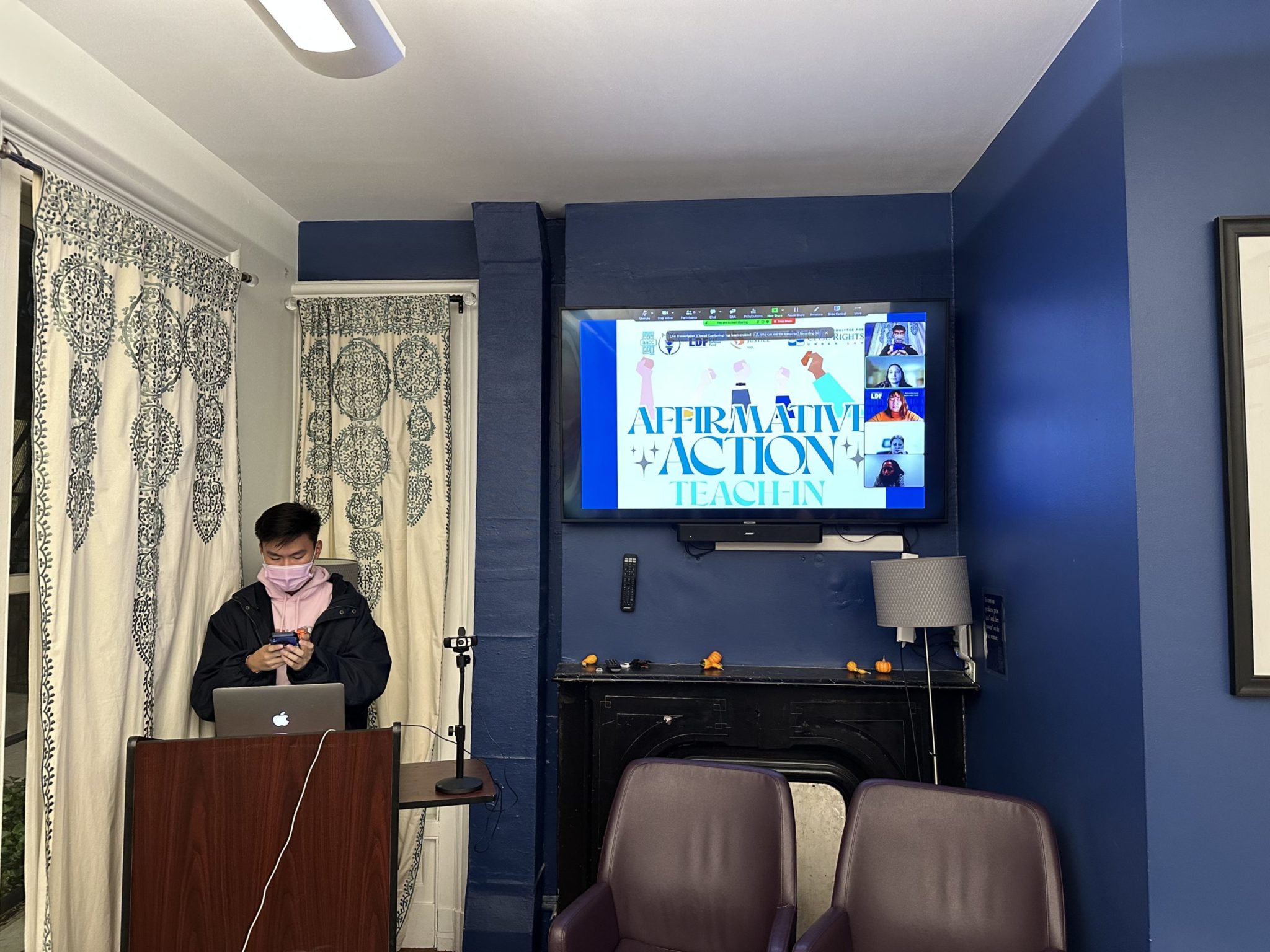Asian students host affirmative action teach-in
Representatives from various legal organizations virtually addressed students at the Asian American Cultural Center the night after the Supreme Court heard pivotal cases involving race-conscious admission

Joshua Zhang, Contributing Photographer
Asian students and organizations on campus are working to dispel misconceptions surrounding affirmative action.
The Asian American Cultural Center hosted a virtual teach-in on Monday night, inviting representatives from the NAACP Legal Defense Fund, Lawyer’s Committee for Civil Rights Under Law and Asian Americans Advancing Justice.
The event, a collaboration with the Asian American Students Alliance, happened hours after the Supreme Court heard oral arguments in two landmark cases that could put an end to affirmative action, or the practice of race-conscious admissions. Speakers presented a history of affirmative action in the United States, summarized the SFFA cases and discussed the oral arguments that were presented that morning.
“The goal was to give our AACC staff and also the broader Yale Asian American community some foundational knowledge about what affirmative action is and what this most recent challenge to affirmative action means for the future of Yale and other institutions of higher education,” said Naina Agrawal-Hardin ’25, a political action and education coordinator at the AACC and political co-chair of AASA.
The teach-in was organized by Agrawal-Hardin, Kevin Quach ’22, SPH ’23, and Jenny Lee ’25. A recording of the teach-in event will be made available on the AACC’s YouTube for those that were unable to attend the event live.
Students for Fair Admissions, the plaintiff in both Supreme Court cases, alleges that both Harvard and UNC discriminated against Asian American applicants.
Quach refuted the notion that affirmative action hurts Asian Americans.
“Asian Americans, even Asian American alumni at Yale, have been long fighting in support of affirmative action.” Quach told the News. “We’re still fighting to this day, and we’re going to keep on fighting, regardless of what happens with the Supreme Court.”
Eighteen AASA members joined a 41-strong cohort of students who traveled to Washington D.C. and protested in support of affirmative action during Monday’s oral arguments. The rest of the cross-cultural delegation was composed of members of the Native and Indigenous Association at Yale, Black Students at Yale and Movimiento Estudiantil Chicano de Aztlán.
Taylor Dumpson, who was one of the lawyers present at the teach-in, is an associate counsel at the Lawyers’ Committee for Civil Rights Under Law. She currently works in the Educational Opportunities Project and the James Byrd Jr. Center to Stop Hate. For the first portion of the teach-in, Dumpson presented an overview of affirmative action and the two court cases.
According to the presentation, affirmative action refers to a set of policies that use race-conscious means to correct for disparities caused by racial discrimination. In a college admissions context, this means that admissions officers may use an applicant’s race as one factor in the holistic evaluation of a student.
This is not the first time affirmative action has crossed the steps of the Supreme Court. The 1978 case Regents of the University of California v. Bakke, which allows race-conscious admissions but not the use of racial quotas, and 2003’s Grutter v. Bollinger, which affirmed that a university may factor race into admissions due to their interest in diversity, are two landmark SCOTUS decisions that have set much of the precedent for affirmative law.
Allison Scharfstein ’12, a legal fellow at the NAACP Legal Defense Fund, explained the significance of the current court cases involving SFFA.
“There is forty years of precedent in Supreme Court cases upholding race-conscious admissions,” Scharfstein said. “And so that is why there’s so much at stake in the Court hearing [cases regarding affirmative action] again.”
Other representatives at the teach-in event, including Niyati Shah, the director of litigation at Asian Americans Advancing Justice, and Rita Wang ’19, a research and intake associate at the NAACP Legal Defense Fund, echoed Scharfstein’s comments regarding the importance of the ongoing SFFA cases.
The teach-in event also discussed SFFA’s lawsuit against Yale, which was held by Connecticut courts in May 2021 pending the Supreme Court’s decision in the Harvard case.
“What the Supreme Court decides in [SFFA v. Harvard and SFFA v. UNC] will, of course, impact this pending, but paused, suit by SFFA against Yale,” Scharfstein said. “So that’s one of the many reasons why we want to keep you abreast and connect with you all about your experiences at Yale.”
Though the oral arguments for SFFA v. Harvard and SFFA v. UNC were both heard on Monday, the Court’s decisions on the two cases will likely be released in spring or summer of 2023.







